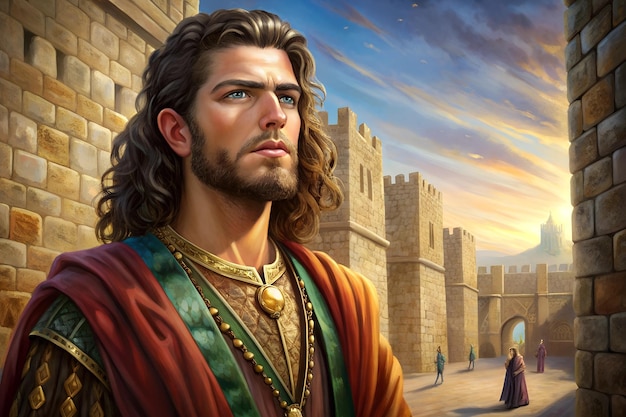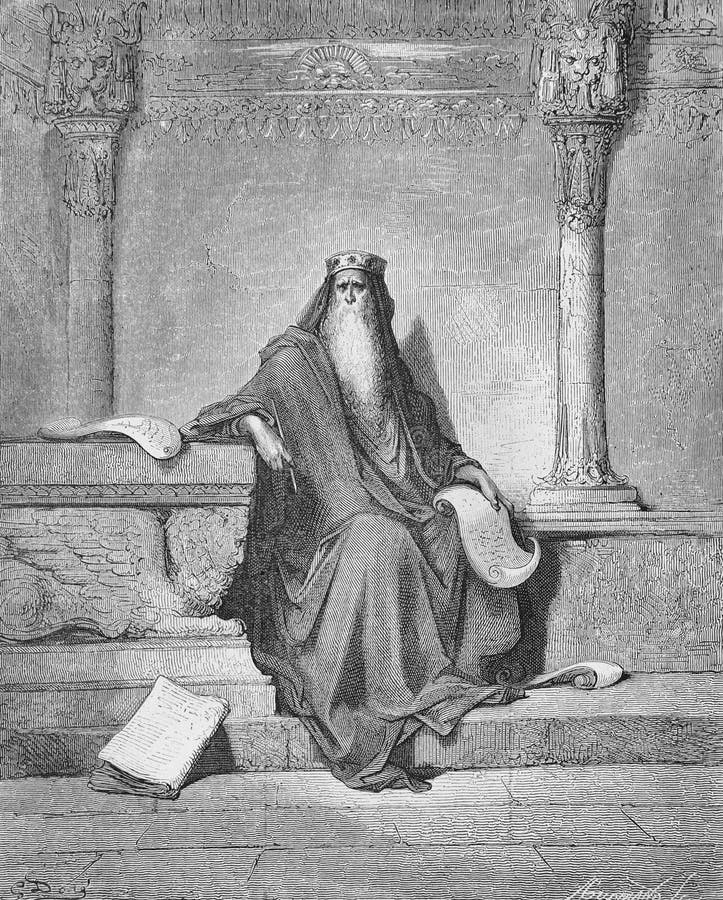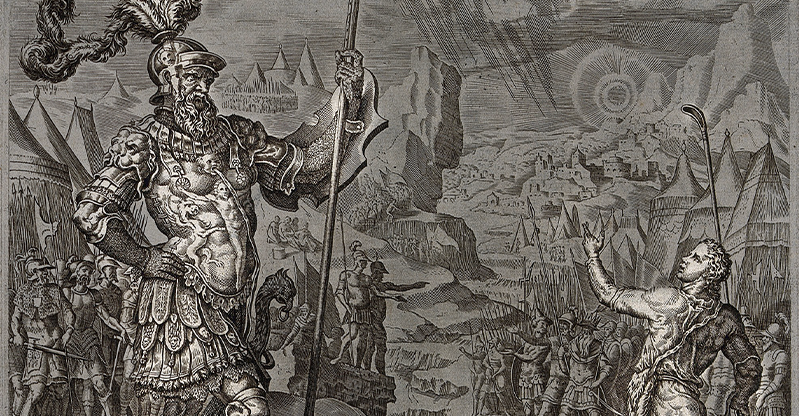The Esoteric Side of King Solomon explores the mystical dimensions of a figure traditionally known from biblical texts as a paragon of wisdom and wealth. Delving beyond the historical and religious narratives, this article uncovers the hidden layers of magic, symbolism, and spiritual practices attributed to King Solomon. These esoteric elements have influenced countless traditions, from ancient grimoires to modern occultism, revealing a complex legacy that blends legend with profound philosophical insights. By examining these aspects, we gain a deeper understanding of how Solomon’s story transcends mere history to embody universal themes of power, knowledge, and the human quest for enlightenment.
Biblical Origins and Esoteric Interpretations

King Solomon’s portrayal in the Bible serves as the foundational text for much of his esoteric reputation, but it is through interpretive lenses that his story gains layers of mystical significance. The biblical accounts depict Solomon as a king blessed with unparalleled wisdom, granted by God in a dream, and this narrative has been expanded upon in esoteric traditions to include themes of divine communication, hidden knowledge, and supernatural abilities. These interpretations often draw from apocryphal texts and later mystical writings, transforming Solomon from a historical figure into a symbol of esoteric mastery. By exploring how ancient scribes and modern mystics have reimagined his life, we can see how the esoteric side of Solomon emerged as a bridge between the material and spiritual worlds.
Solomon’s Wisdom in the Bible

Solomon’s wisdom is first chronicled in the Book of Kings and Chronicles, where he is described as receiving divine insight that allowed him to solve riddles, judge fairly, and amass knowledge beyond human capability. This wisdom wasn’t just intellectual; it was portrayed as a gift from God, often manifesting in dreams and visions that guided his rule. Esoterically, this has been interpreted as an initiation into higher states of consciousness, where wisdom becomes a tool for spiritual alchemy. For instance, the famous story of Solomon judging between two mothers claiming the same child demonstrates not only cleverness but a deep intuitive understanding of human nature, which esotericists see as akin to psychic abilities or empathetic divination.
In esoteric traditions, Solomon’s wisdom is linked to the concept of the “divine mind,” where human intellect aligns with cosmic forces. This idea permeates texts like the Talmud and Kabbalistic writings, which expand on biblical stories to suggest that Solomon’s wisdom involved accessing akashic records or universal knowledge. Such interpretations go beyond the literal, proposing that Solomon’s encounters with God and his ability to interpret dreams were rituals of enlightenment, similar to those found in mystery schools. This esoteric lens transforms Solomon’s biblical wisdom into a metaphor for personal transformation, encouraging seekers to pursue inner wisdom through meditation and spiritual disciplines.
Moreover, the biblical emphasis on Solomon’s vast library and scholarly pursuits has fueled esoteric speculation about lost texts and secret teachings. Legends speak of Solomon possessing books of magic and prophecy, which were purportedly hidden or destroyed, adding an aura of mystery. This not only enriches the narrative but also invites contemplation on the nature of knowledge itself—whether it is a divine gift or something attained through esoteric practices like invocation and contemplation.
Esoteric Twists on Biblical Stories

Biblical stories involving Solomon have been reinterpreted in esoteric contexts to highlight magical elements not explicitly stated in scripture. For example, the construction of the First Temple is described in the Bible as a monumental achievement, but esoteric traditions infuse it with supernatural undertones, such as the use of the mythical shamir worm to cut stones without iron tools. This twist suggests that Solomon employed esoteric methods, possibly drawing from elemental magic or alliances with otherworldly beings, to achieve architectural marvels. Such interpretations position Solomon as a practitioner of high magic, using ritual and symbolism to manifest divine will on earth.
Another key story is Solomon’s judgment and his interactions with foreign rulers, like the Queen of Sheba, which esotericists view as allegories for spiritual quests and the exchange of sacred knowledge. The Queen of Sheba’s visit is often seen as a test of Solomon’s wisdom, symbolizing the union of masculine and feminine principles in alchemy and mysticism. In these retellings, the gifts she brought—spices, gold, and precious stones—are interpreted as representations of spiritual elements, such as enlightenment, material transformation, and the philosopher’s stone. This esoteric layer adds depth, turning historical anecdotes into parables for personal and collective evolution.
Furthermore, the biblical account of Solomon’s downfall, attributed to his many wives and idol worship, is reimagined in esoteric lore as a cautionary tale about the dangers of unchecked power and the seduction of lower astral forces. Texts like the Testament of Solomon portray his later years as a battle against demons he once controlled, emphasizing the need for balance in esoteric pursuits. This narrative arc not only humanizes Solomon but also serves as a teaching tool in traditions like Hermeticism, warning that true wisdom requires ethical integrity and self-mastery.
The Role of Dreams and Visions
Dreams and visions are central to Solomon’s biblical story, most notably in the dream where God offers him a wish, and he chooses wisdom over wealth. Esoterically, this is seen as a classic initiation rite, where dreams act as portals to higher realms. In various mystical traditions, such experiences are cultivated through techniques like lucid dreaming or astral projection, which Solomon is believed to have mastered. This interpretation elevates dreamsto a realm of significance, highlighting them as a conduit for divine wisdom and insight.
The Symbolism of Dreams in Solomon’s Life
In esoteric traditions, dreams are not merely the product of our subconscious mind but are viewed as sacred communications from the divine. In the story of Solomon, his dream signifies a moment where the boundary between the mundane and the spiritual blurs. This pivotal experience is often seen as an initiation into higher states of consciousness, setting the tone for his reign. In this narrative, choosing wisdom symbolizes a collective aspiration to seek knowledge over material gain, a theme echoed across various spiritual paths.
Solomon’s dream serves as an allegory for the process of self-discovery and spiritual growth. It invites us to reflect on our own aspirations—what do we seek when we reach out to the universe? Are we asking for wealth, security, or something deeper? Esoterically, this suggests that true fulfillment lies not in external possessions but in inner enlightenment and understanding. By analyzing his choices through this lens, we see how Solomon embodies the archetype of the seeker—a figure who represents humanity’s quest for deeper truths.
The interpretations surrounding Solomon’s dreams connect to broader themes found in mystical practices, where dreams are treated as sacred tools for divination and self-knowledge. For example, many esoteric schools advocate for dream journaling as a means to decipher messages from the higher self or spiritual guides. Thus, Solomon’s experiences metaphorically illustrate how dreams can guide us towards greater wisdom if we learn how to interpret their symbols.
Divine Communication and Intuition
Solomon’s ability to communicate with the divine through dreams raises essential questions about intuition and the nature of spiritual guidance. In biblical accounts, he possesses a unique connection to God that allows him to access profound insights. Esoterically, this relationship is viewed as a model for cultivating one’s intuitive faculties, suggesting that all individuals possess the potential for divine communication.
This aspect of Solomon’s character encourages practitioners of esoteric traditions to develop their intuitive skills. Intuition is often regarded as a pathway to understanding hidden truths. For instance, those engaged in meditation or contemplative practices frequently report heightened awareness of their surroundings, leading to insights that guide their decisions. Solomon thus becomes a symbol of what it means to trust one’s inner voice, reinforcing the idea that wisdom arises not only from intellectual reasoning but also from deep spiritual attunement.
Furthermore, Solomon’s gift for interpreting signs and omens demonstrates a key principle in esoteric thought: the belief that everything in the universe is interconnected. His dialogues with other figures, such as the Queen of Sheba, reveal that wisdom is not just an isolated trait but rather a shared experience enriched by diverse perspectives. This underscores the importance of collaboration, dialogue, and openness to new ideas in the pursuit of knowledge.
The Transformative Power of Visions
Visions in Solomon’s life often serve as catalysts for change, propelling him toward actions that have far-reaching consequences. The biblical narrative highlights moments where Solomon receives instructions or warnings through visions, emphasizing the transformative power of these experiences. From an esoteric standpoint, visions symbolize awakening—a call to transcend ordinary existence and embody deeper truths.
Engaging with visions requires a level of discernment, as not every vision may align with one’s highest good. Solomon’s journey exemplifies the necessity of ethical considerations when navigating esoteric realms. Each vision carries with it a responsibility, urging individuals to act in alignment with a higher purpose. As Solomon navigates the complexities of rulership, he learns that wisdom must be tempered with integrity, a lesson applicable to anyone striving for personal or professional advancement.
Moreover, the esoteric interpretation of visions suggests that they can guide us through life’s challenges. Just as Solomon faced dilemmas requiring profound insight, so too do we encounter obstacles demanding clarity and direction. By embracing practices like visualization, dream analysis, or guided meditations, individuals can cultivate greater awareness and facilitate transformation in their lives. This process mirrors the alchemical journey of turning base materials into gold—an ongoing endeavor reflecting the aspirant’s internal work and dedication.
Conclusion

The exploration of King Solomon’s legacy reveals a rich tapestry woven with themes of wisdom, divine communication, and the transformative power of dreams. Through both biblically-rooted narratives and esoteric interpretations, Solomon emerges not just as a historical figure but as a timeless archetype representing the human quest for enlightenment. His journey illustrates the complexities inherent in seeking knowledge and the importance of balancing intellect with ethical integrity.
As we delve into the essence of Solomon’s character, we uncover valuable lessons transcending time and culture, encouraging us to pursue our own quests for truth, wisdom, and understanding. Whether through meditation, reflection, or communal dialogue, we are invited to engage with the mysteries of existence and embrace the infinite possibilities that lie within our grasp.

GIPHY App Key not set. Please check settings